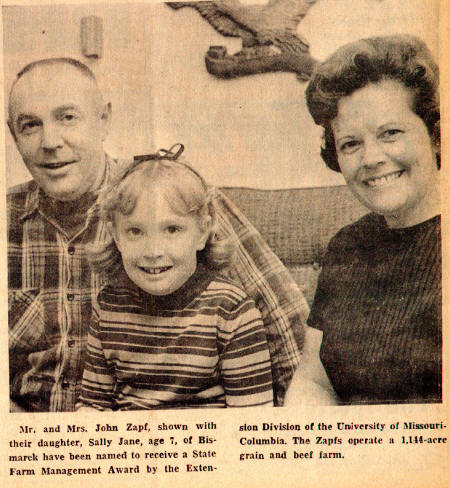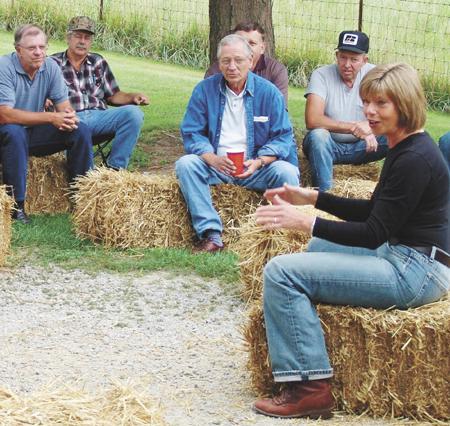ZAPF FAMILY FARMING 1,144 ACRES |
|
Mr. and Mrs. John Zapf, Bismarck, are operating a growing 1,144 acre farm business. Behind that expansion has been a goal set by the young couple to expand the farm business by 10 percent a year. In working toward that goal, the Zapfs have added 708 acres to the farm in the last seven years. In recognition of their progress in farming, the Zapf family has been named to receive a State Farm Management Award given by the Extension Division of the University of Missouri-Columbia. The Zapfs have a daughter, Sally Jane, 7. In expanding the farm business, the Zapfs have also diversified. They are producing high yields of corn, wheat, soybeans, milo, hay, pasture, and potatoes. They also have a beef cow herd. Zapf, 38 years old, returned to the family farm when he got out of the service in 1955. "Dad and grandpa had always done truck farming," Zapf said. The farm was started in 1895 when his grandfather, Traugott, bought the original 40 acres of Brookside Farm. Early production of fruit and vegetables were delivered to the Lead Belt by team and wagon. The shortage of labor in World War II forced a cut back in truck crop production on the farm. However, following in the family tradition, Zapf continues to grow 25 acres of potatoes a year. "John is the only commercial potato grower in our area," said Bill McCreery, Extension area farm management specialist. Although potatoes are a good crop, Zapf plans no expansion in that area. Growing more potatoes would only result in marketing problems, he said. Although Zapf does have a diversified operation, cash grains receive top priority and are the main source of income. This year he produced 330 acres of corn, an increase of 30 acres over the previous year. Last June, Zapf aerial-sprayed 360 acres of cut-over brush land in the first step to converting to grassland. Fescue, also sown from the air, is already becoming established. Zapf figures he can spray and seed the brush land for $30 an acre which is about one-third the cost of having the land cleared with a bull-dozer. The cost includes two applications of spray to kill the brush and to windrow the dead trees with his own dozer. He has spent $7.50 per acre for one spraying and seeding. A herd of 96 Polled Hereford cows will be doubled in size as additional grass becomes available. Zapf does not feed out the calves. Sometimes they are sold directly from the cows and other times they are held over and carried through the next summer on grass. Last year, the steer calves were sold in the fall and the heifers held over and sold in the spring. "It all depends upon the feeder price and the cash flow in my farm business," he added. Zapf's parents are still active in the farm business. His father, Henry, age 70, helps with cultivating corn, harvesting potatoes, checking the cow herd, and many other chores. His mother is in charge of the farm business records, which are kept with the Production Credit Assn. computer system. In addition to his farming operation, Zapf has the Massey-Ferguson dealership for the area. The Zapfs are in many community activities. Mrs. Zapf is assistant home service chairman for the American Red Cross, does volunteer work at the Mineral Area Hospital in Farmington, is a member of the W.S.C.S. in the local church, and has taught school. |
|
| THE DAILY JOURNAL, Park Hills, St. Francois Co. MO, Thurs. Oct. 6, 1994, page 2 NORMA ZAPF Norma Ruth "Blue" Zapf, 64, of Bismarck died Oct. 4 [1994] at Mineral Area Regional Medical Center. She was born Jan. 5, 1930 in Bismarck. She was preceded in death by her father, Eugene Boyer. Mrs. Zapf was a member of the Bismarck United Methodist Church where she was the music director of Children's Choir and the United Methodist Women. She was a teacher at Bismarck R-5 School since 1951. She was also a member of the Mineral Area Regional Medical Center Auxiliary. She is survived by her husband, John Zapf of Bismarck; one daughter, Sally Jane (Mrs. Keith) Colwell of Bismarck; her mother, Dorothy G. Boyer of Park Hills; one brother, Samuel J. Boyer of North Ridge, Calif.; one sister, Myra Jean Myers of Tampa, Fla.; one grandson; one step-granddaughter; one uncle, two aunts; nieces and nephews; many close friends. Visitation will be Thursday after 5 p.m. at the Shipman Funeral Home in Bismarck. Funeral services will be held Friday at 10:30 a.m. at the Bismarck United Methodist Church with the Rev. John Adams. Burial will be in the St. John Catholic Cemetery. Memorials may be made to the Bismarck United Methodist Church Memorial Fund. |
|
Congresswoman goes down on the farm
By LEROY SIGMAN\Daily Journal Staff Writer Making a brief stop south of Farmington Wednesday afternoon
during her annual farm tour, U.S. Rep. Jo Ann Emerson (R-8th) told local farmers she will
try to help expedite the regulated use of mine waste for agricultural lime. |

